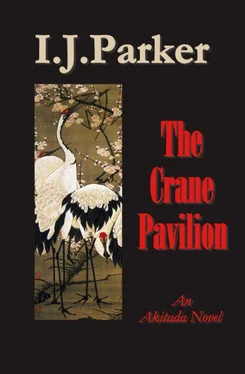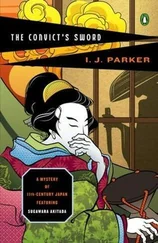I. Parker - The Crane Pavillion
Здесь есть возможность читать онлайн «I. Parker - The Crane Pavillion» весь текст электронной книги совершенно бесплатно (целиком полную версию без сокращений). В некоторых случаях можно слушать аудио, скачать через торрент в формате fb2 и присутствует краткое содержание. Жанр: Исторический детектив, на английском языке. Описание произведения, (предисловие) а так же отзывы посетителей доступны на портале библиотеки ЛибКат.
- Название:The Crane Pavillion
- Автор:
- Жанр:
- Год:неизвестен
- ISBN:нет данных
- Рейтинг книги:5 / 5. Голосов: 1
-
Избранное:Добавить в избранное
- Отзывы:
-
Ваша оценка:
- 100
- 1
- 2
- 3
- 4
- 5
The Crane Pavillion: краткое содержание, описание и аннотация
Предлагаем к чтению аннотацию, описание, краткое содержание или предисловие (зависит от того, что написал сам автор книги «The Crane Pavillion»). Если вы не нашли необходимую информацию о книге — напишите в комментариях, мы постараемся отыскать её.
The Crane Pavillion — читать онлайн бесплатно полную книгу (весь текст) целиком
Ниже представлен текст книги, разбитый по страницам. Система сохранения места последней прочитанной страницы, позволяет с удобством читать онлайн бесплатно книгу «The Crane Pavillion», без необходимости каждый раз заново искать на чём Вы остановились. Поставьте закладку, и сможете в любой момент перейти на страницу, на которой закончили чтение.
Интервал:
Закладка:
Back outside the compound, he circled around the block that was Genshin’s property and arrived at a quarter of very modest homes. Workers and artisans, scribes and low-ranking officials lived in these houses. The wall that protected the noble compound from the lower classes had a small gate on this side. He tested it and found it locked. Apparently, this had not been so before the lady’s death, but Koshiro had wasted no time keeping the children away in the future.
He glanced across the street and saw a group of children playing under a large catalpa tree. They were all younger than ten, he guessed, and both boys and girls. When he had walked across, he noticed an old woman sitting under the tree and was relieved that the children had not been left without some sort of supervision.
Seeing a formally dressed nobleman approaching, the old woman struggled to her feet and bowed deeply.
“I see you look after all these children,” Akitada said, smiling. “It must be difficult. They seem very energetic.”
She returned a toothless smile and bobbed another bow. “So they are, your Honor, so they are. Regular mice, they are so quick. But they’re mostly good children, and I really only look after my own.” She giggled and raised a hand to her mouth to stifle the merriment. “I mean my daughter’s children, of course. That’s them over there.” She pointed to a cluster of four boys engaged in kicking a small stone about.
“Sturdy boys,” Akitada complimented her. “I’m looking for two particular children, a girl and her smaller brother. I believe they live in this neighborhood and used to visit a lady in the big house over there.” He pointed across the street.
“Oh,” she said. “The poor lady who hanged herself?” Again the hand covered her mouth. “Sorry, sir. I shouldn’t talk about such things.”
“It’s all right,” he reassured her. “I wonder, are those children here, by chance?”
She nodded and pointed to a pair who sat nearby, looking forlorn as they watched the other children. “The girl’s called Maeko and the boy Shiro. Their mother’s a widow who works as a cleaning woman. They’re alone during the day.” She shook her head. “That’s not a good way for children to grow up. Look at them. They just mope around. Are they in trouble for going over there?”
Akitada got the impression that she would have welcomed some trouble for them to prove the point that families had a duty to watch over their children. He thought of his own two who were close in age. But unlike the poor widow’s children, they had servants to look after them. Who knew what dire straits the mother was in? He said firmly, “No, no trouble at all. They seem to be good children and they were invited by the lady.”
“Not to start with,” corrected the old woman. “They went over there to look around because they were bored. I know they did. They came back talking about how beautiful the garden is and how there’s a lake with ducks and cranes and beautiful buildings. I had my hands full to keep the rest of the kids from running off to see.”
That explained her resentment. Akitada thanked her and walked over to the two children. They got to their feet, looking nervous, but making him a bow. The girl was thin but neat in her faded blue and white dress with her braid hanging down her back. The boy, in short pants and a simple shirt, was less tidy, and his short hair stood up in small uneven tufts. Both were barefoot. The weather was already too cold for such inadequate attire, but they did not seem to feel it.
Akitada smiled at them. “I think you must be Lady Ogata’s young friends.”
The girl’s eyes widened and she grasped her brother’s hand as if she were about to run away, taking him with her. Akitada crouched to bring his face to their level. He meant to reassure them when the boy burst into tears.
“I didn’t do it,” he cried. “I didn’t touch her. Please don’t hit me. I didn’t mean to.”
The girl put an arm around him. “Hush, Shiro. The honorable gentleman isn’t asking about that.”
The boy gulped and fell silent, but Akitada wondered. He stood up again and said gently, “Nobody is going to beat you. I won’t allow it. I just stopped by to tell you how grateful everybody is that you were so brave the morning you found her dead.”
The girl looked uncertain, but the boy brightened immediately. “I was brave. Did you hear, Maeko?” he told his sister. “The honorable gentleman just said so.” He wiped away his tears and smiled at Akitada, who smiled back and nodded.
Akitada asked the girl. “You must have been very sad that the lady died.”
She nodded. “We miss her a lot,” she said simply. “She was very good to us.”
Shiro said, “She gave us sweets.”
In spite of the lady’s great poverty, she had saved sweets for the children. She had expected them that day. Akitada said, “Yes, she was very kind. Many people must miss her like you do, but they don’t know that she has died. You see, we don’t know who she was, where her family lives.”
The girl looked puzzled. “Her name was Lady Ogata, but we call her the lady of the crane pavilion.”
Her brother explained, “’Cause there’s cranes there. Two of ‘em, and sometimes three. The lady owns the cranes. She said her house is called the crane pavilion because of the cranes.”
“A pretty name,” Akitada said. “But I wondered about her parents. Or perhaps she had brothers and sisters. They should be told, so they can pray for the lady’s soul. Did she ever talk about them?”
They looked at each other and shook their heads. “The lady was alone,” said the girl. “She never talked about anyone. We didn’t think she had a family. She liked us to come because she was lonely and we were alone, too. She told us stories, and sometimes she sang songs and we danced. She danced beautifully. She was going to teach me.” Her eyes filled with tears at the memory.
It was not much, but the singing and dancing raised a new idea in Akitada’s mind. What if this “Lady Ogata” had really been an entertainer? Some of those talented young women made names for themselves and even married into good families. They often ended up being kept by noblemen in separate establishments where they could be visited without the wives being any the wiser.
And that, of course, again made him think of Tasuku, or rather Abbot Genshin. Though, if she had indeed been the abbot’s mistress, he had hardly provided her with the luxuries such women expected. No. There must be another mystery here.
“If it doesn’t trouble you too much,” he asked, “could you tell me about your last visit?”
They looked at each other. The boy’s lower lip started to tremble, and Akitada was sorry he had asked. But Maeko nodded and gave her account about how they had come as usual, only to find Lady Ogata hanging by the neck from one of the rafters. They had thought to run away, but Maeko had decided to call for help and headed toward Koshiro’s house. She had had a vague idea that Koshiro, being tall and strong, could untie the scarf and lift her down, and all would be well. They knew better now and were very sad.
A brief silence fell when she finished. Into this, the boy said again, “I really didn’t mean to do it. Honestly!” Tears threatened to spill again.
Akitada crouched again. “Don’t cry, Shiro,” he said. “You’re a brave boy and brave boys don’t cry.”
Shiro sniffled and nodded.
“What did you do that worries you so? I promise you won’t be in trouble.”
The boy looked up at his sister first, then said, “I touched her. Just a little. She moved. Like she was floating.” He hung his head.
His sister said, “He really only barely touched her foot. He didn’t know any better.”
Читать дальшеИнтервал:
Закладка:
Похожие книги на «The Crane Pavillion»
Представляем Вашему вниманию похожие книги на «The Crane Pavillion» списком для выбора. Мы отобрали схожую по названию и смыслу литературу в надежде предоставить читателям больше вариантов отыскать новые, интересные, ещё непрочитанные произведения.
Обсуждение, отзывы о книге «The Crane Pavillion» и просто собственные мнения читателей. Оставьте ваши комментарии, напишите, что Вы думаете о произведении, его смысле или главных героях. Укажите что конкретно понравилось, а что нет, и почему Вы так считаете.












